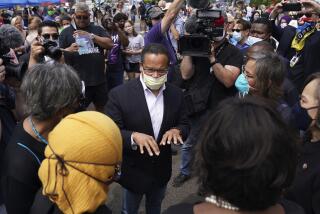‘Holistic’ Plan Urged to Aid Black Males
- Share via
WASHINGTON — A national task force on black men and boys, advocating a “holistic approach” to helping one of the nation’s most endangered populations, on Tuesday recommended year-round school schedules, more boarding schools, a domestic “peace corps” and educational initiatives to teach young black males everything from parenting skills to classical music.
“We are trying to save urban America, not for black people but for everybody,” proclaimed Andrew Young, the former civil rights leader, Atlanta mayor and United Nations ambassador who chairs the task force. “It’s a shock to me . . . to see young people so angry and hostile. I too find myself afraid of our own children.”
The group’s 18-month study focuses on ways that black communities can help redeem a faltering generation of boys through the coordination of grass-roots action rather than through federal government programs.
Coming six months after the “Million Man March” on Washington, the task force’s sweeping plan--laid out in a book titled “Repairing the Breach”--offers both broad direction and specific programs to address the daunting problems facing the nation’s more than 14 million black males. Those problems range from a homicide rate that is eight times higher than that for white males to a poverty rate that claims almost 3 in 10 black males--three times higher than the rate for whites.
“We believe in effect it does provide a plan” for translating many of the broad goals of the “Million Man March” into action, said Bobby William Austin, director of the task force. “You’ve got to have something that people can go back and do. And we believe this can be part of that agenda.”
*
While many of the report’s recommendations would affect urban communities in particular, others are designed to create a broader atmosphere in which young black males feel engaged in a society that values them.
The task force, for instance, recommended that a media production center be established to “develop those civic stories” that would give young African Americans a sense of history and community. The task force recommended that a nationwide library program for African American boys be developed, along with curricula in everything from time management to entrepreneurship.
The task force, an initiative of the W.K. Kellogg Foundation, already has underwritten 32 projects aimed at serving black men and boys. Among them are education programs dealing with high-school dropouts, entrepreneurial programs to restore prosperity to inner-city communities, and family and parenting programs designed to engage inner-city black males as fathers.
Austin said that the task force has provided an umbrella under which organizations--such as churches, universities, fraternities and community groups--can pool their efforts on behalf of boys and men in the inner city.
“You’re talking about several million middle- and upper-middle-class men, all those people are part of this process,” said Austin. “They want to put their power and might together with grass-roots people, and this provides the venue.”
*
In unveiling the report, Young stated that many of the problems afflicting black males “are derivative.” They stem, he said, from “good intentions but bad public policy.” Young echoed many of the criticisms cited by advocates of welfare reform, including rules that keep men from residing in homes where mothers and children receive federal aid. But he was also critical of current efforts, many of them pressed by congressional Republicans, to force mothers of young children into the labor market.
In what organizers hope will be one of the task force’s most enduring contributions, it has organized the Village Foundation, a Washington-based philanthropy that aims to raise as much as $50 million over the next five years to support programs targeted at helping black boys and men. The Kellogg Co. of Battle Creek, Mich., committed $1 million Tuesday to help underwrite the foundation.
“One thing untapped in the African American community is the philanthropic impulse,” said Austin.
More to Read
Sign up for Essential California
The most important California stories and recommendations in your inbox every morning.
You may occasionally receive promotional content from the Los Angeles Times.














